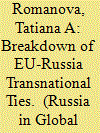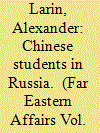|
|
|
Sort Order |
|
|
|
Items / Page
|
|
|
|
|
|
|
| Srl | Item |
| 1 |
ID:
186776


|
|
|
|
|
| Summary/Abstract |
The article aims to explore the causes and consequences of the profound
change in transnational ties between Russia and the European Union after
February 24, 2022, that is, contacts that bypass official authorities and
directly involve Russian and EU citizens (in business, science, education,
culture, sports, and non-governmental organizations’ activities). The
breakdown of ties is unique in speed and scale. Five causes of the breakdown
of transnational ties have been identified: the position of EU officials
towards Russian society; the rise of the war paradigm in the West and its
pluralization (that is, its implementation on different tracks); reputational aspects; the perception of Russian society as homogeneous in supporting
the operation in Ukraine; and pressure from Ukraine itself. As a result,
relations between Russia and the EU have become more politicized and
have lost the potential for resilience and mutual socialization. By limiting
transnational ties, EU players help Russia’s ruling elite consolidate society
and limit alternative thinking; they also change the vector of EU civilian
power. At the same time, the rupture of transnational ties delivers a major
blow to the universality of Western institutions, which will determine the
pace of recovery both for Russian supporters of close relations with the West
and for their opponents. The article also pinpoints certain mechanisms for
rebuilding transnational ties in the medium term.
|
|
|
|
|
|
|
|
|
|
|
|
|
|
|
|
| 2 |
ID:
089608


|
|
|
|
|
| Publication |
2009.
|
| Summary/Abstract |
The interest of Chinese young people in studies in Russia is conditioned by the requirement for qualified personnel due to the development of bilateral economic cooperation, and it is also prompted by a comparatively low cost of education. Despite the perceptible atmosphere of xenophobia, Chinese students assess their stay in Russia positively, in the main, and express the desire to work in our country after completing their studies, or, at least, to maintain regular business connections with it. Although most of them do not master Russian well enough, they do not stay jobless. China shows readiness to use the services of Russian institutions of higher learning on a broader scale, but, apparently, they are not prepared for that
|
|
|
|
|
|
|
|
|
|
|
|
|
|
|
|
| 3 |
ID:
124366


|
|
|
|
|
| Publication |
2011.
|
| Summary/Abstract |
Persistent reports describe the pervasiveness and intensity of Palestinian incitement against Israel. The Palestinian Authority is an oligarchy whose purpose is war against Israel. Its leaders consider deception and the "armed struggle" as the legitimate means by which they can achieve their goals and have adapted their educational system to fill the younger generation with hatred and the desire to perpetrate terrorist acts. Because of the reality behind it, incitement is the real "deal-breaker." One side wants peace, while the other does not.
|
|
|
|
|
|
|
|
|
|
|
|
|
|
|
|
|
|
|
|
|